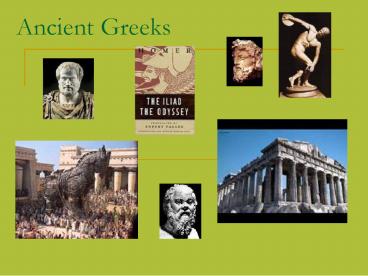Ancient Greeks - PowerPoint PPT Presentation
1 / 28
Title:
Ancient Greeks
Description:
Greek gods and goddesses ... write a five line typed description on eight famous Greek gods or goddesses. ... Included marble temples dedicated to the gods. ... – PowerPoint PPT presentation
Number of Views:204
Avg rating:3.0/5.0
Title: Ancient Greeks
1
Ancient Greeks
2
Geography
- The Sea
- Aegean Sea
- Ionian Sea
- Black Sea
- Important for transportation and
- trade
3
Geography
- Land
- Mountains cover about ¾ of the land
- Small independent communities developed
- Only 20 was suitable for farming
- Grains, grapes, and olives
- Climate
- 48 in the winter
- 80 in the summer
4
Mycenaeans
- City-state Mycenae (my-SEE-nee)
- Ruled by warrior-kings
- Trojan War
- Thought to fictional
- At least the story was based on real cities,
people, and events - Who knows the story?
5
Homer
- Blind man
- Poet and author
- Traveled from village to village playing harp and
telling heroic tales. - Stories passed down orally for generations, until
finally written down. - Iliad and Odyssey
- Iliad
- Achilles versus Hector
- Odyssey
- Odysseuss use of the Trojan horse and travel
home to wife Penelope
6
Myths
- Used to understand the mysteries of nature and
the power of human passions
7
Greek gods and goddesses
- Using the Websites below please write a five line
typed description on eight famous Greek gods or
goddesses. - http//www.mythweb.com/
- http//www.greekmythology.com/
- Due Friday, November 30
8
Rise of City-States
- Unlike Egypt and Mesopotamia, Greece did not
create one large Empire. - Divided into city-states.
- Defended their independence fiercely.
9
What city-states looked like
- Cities were called the polis
- Built on two levels.
- Top level on the hilltop called the Acropolis.
- Included marble temples dedicated to the gods.
- Bottom level below included the walled city
limits, market place, theater, public buildings
and homes.
10
11
Forms of Government
- Monarchy
- Rule is hereditary
- Rule by a king or queen
- Divine right
- Practiced in Mycenae
- Aristocracy
- Rule by nobility
- Based on land ownership and hereditary
- Social status and wealth support rulers
authority - Practiced in Athens
12
Forms of Government
- Oligarchy
- State ruled by a small group of citizens
- Based on wealth
- Control military
- Practiced in Sparta
- Direct Democracy
- Ruled by citizens
- Majority
- Practiced in Athens
13
Greek Culture
- Tragedy
- Serious drama about common themes such as love,
hate, war and betrayal. - Satyr
- Performed between the acts of tragedies. They
made fun of the predicament of the tragedy's
characters. - Comedy
- Scenes filled with slapstick situations and
poked fun at men in power.
http//library.thinkquest.org/CR0210200/ancient_gr
eece/face_memory.htm
14
Wars in Ancient Greece
15
Persian Wars
- Persians versus Greeks
- Greeks used a phalanx
- Soldiers standing side by side
- Major battle occurred at the city of Marathon
- Greeks win and sent Pheidippides back to Athens
- Outcome of the wars is the formation of the
Delian League
16
Peloponnesian War
- Sparta versus Athens
- Athens navy v. Spartan army
- Athens population were trapped within the city
wallsa mysterious plague killed almost 2/3 of
the population - Athens surrender to Sparta
17
Greek Culture
- Parthenon
- Inside was a statue of Athena by the sculptor
Phidias
18
Socrates
- One of the first great Greek philosophers
- Encouraged students to examine their beliefs
- Question and answer teaching
- Died by drinking hemlock
19
Plato
- Studied under Socrates
- Formed a school called The Academy that lasted
for 900 years
20
Aristotle
- Taught by Plato
- Studied at The Academy
- Opened his own school that rivaled Platos school
21
Alexander the Great
- From Macedonia
- FatherPhillip II
- Phillip will take control of Greece before
Alexander comes into power - Alexander believed to be bi-sexual
22
Alexander the Great
- After the death of his father, Alexander gains
support from the army - He becomes King of Macedonia
23
Alexander the Great
- Invasion of Persia
- Plan was a goal of his fathers
- Alexander drove his soldiers to Anatolia
- Alexander was victorious
- Egypt
- Conquered Egypt
- Was seen as a liberator for some in Egypt
- While in Egypt sought to discover if he was a god
or not
24
Alexander the Great
- Conquering of Persian Empire
- Wanted to conqueror Persia and Darius III, leader
of the Persians - Darius III had avoided capture several times,
because of this Alexanders desire to capture him
grew - When Alexander found Darius, he was already dead
- Alexander conqueror 90 of the known world of the
Greeks and Persians
25
Alexander the Great
26
Hellenistic Culture
- Hellenistic- blend of Egyptian, Persian, and
Indian influences - Cultures blended due to the travels of Alexander
and his troops
- Alexandria became the center
- Several cities are named Alexandria, but the one
in Africa became the most important - It became the center for commerce
27
Hellenistic Culture
- Science and Technology
- Eratosthenes (HER- uh-TAHS-thud-NEEZ), closely
calculated the earths true size - 24,662 miles for him v. 24,860 miles
- Hipparchus invented longitude and latitude
28
Hellenistic Culture
- Math and Physics
- Euclid- developed a geometry text
- His book Elements was used until the 1900s
- Archimedes- developed the value of pi































